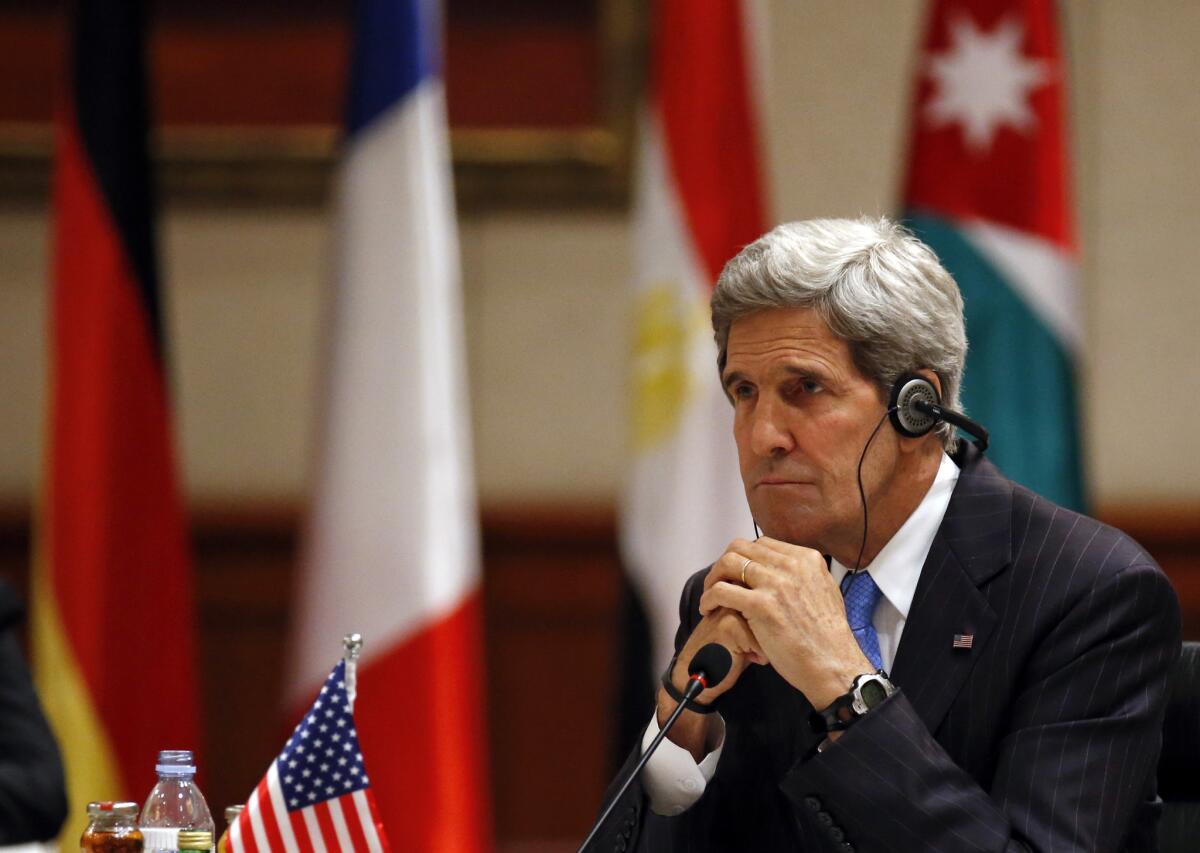Perils of peace conferences

- Share via
Getting into wars is easier than getting out of them. Could the same logic apply to peace conferences? Indeed, could U.S. diplomacy — however well intentioned — actually make matters worse?
Secretary of State John F. Kerry has two diplomatic tracks in the works: ending a civil war in Syria and promoting a peace between Israelis and Palestinians. Both will be difficult to get started, but the real challenge will come the day after.
Diplomatic conferences and events are usually good for one of two things: launching a serious process of negotiation or concluding one.
What the U.S. confronts with both the Syrian civil war and the impasse in the Israeli-Palestinian peace process is a kind of twilight zone that’s betwixt and between. The parties involved don’t know whether they really want to start a political process, and they certainly don’t know how to conclude one.
On Syria, you have challenges of galactic proportion: 80,000 dead, millions of refugees and internally displaced people, and radicalization and fragmentation that have increased the urgency of a political transition but hardened all parties’ willingness to bring one about.
But there’s a much more basic problem for conference planners: Who’s going to talk to whom and about what? Trying to reconcile the motives of the three Rs — Russians, rebels and the regime — seems almost impossible.
Moscow hasn’t moved off its view that Syrian President Bashar Assad may be part of the problem, but he also must be part of the solution. Russian President Vladimir Putin is simply not going to allow the Americans to intervene and remove yet another client: Saddam Hussein. Moammar Kadafi. Assad.
The rebels have no intention of accepting a semi-permanent transition that risks leaving regime elements whole, in Syria, and beyond the reach of war crimes tribunals.
And the government will use its presence at Geneva 2.0 and its recent military gains to buy time and validate its legitimacy as part of the process.
As for the U.S., its instincts are right: There’s no military solution to the Syrian crisis in sight, so why not try the political track again.
Some of this is pure avoidance diplomacy. Indeed, President Obama has willfully avoided militarizing America’s role because he believes the relationship between the application of U.S. military power and the end-game is so uncertain. Nor does he want the United States to get stuck with the check on Syria. And yet, without an improvement of the rebels’ fortunes on the ground, why would Assad have any stake in negotiating?
Indeed, a successful conference — if one actually convenes — provides ample room for mischief. The Russians will see their strategy validated; Assad too; and the opposition, even if it’s strong-armed into participating, could find itself more divided and facing a government that has skillfully played the international community. Iranian participation would boost Tehran’s influence too.
On the second front, prospects for an event that relaunches Israeli-Palestinian negotiations may be brighter. Nobody wants to be blamed for the collapse of Kerry’s efforts.
The question is what happens the day after. Can the U.S. find a formula on the core issues — particularly on territory — that meets the Palestinian need to define a border based on the June 1967 lines and the Israeli desire to avoid that focus and to discuss security first?
Resuming negotiations without such an understanding almost certainly will lead to a collapse, destroy what remains of the peace process and probably accelerate violence, not delay it. And resumption without a commitment on the part of Obama to be tough on both sides when the inevitable impasse occurs will also make matters worse.
Right now, this is Kerry’s peace process. It’s not at all clear that the president, having reset his relationship with Israel and Benjamin Netanyahu, wants to invest in a process that will lead to serious tension with the Israeli prime minister.
In the end, if the Kerry effort produces another false start or leads to more process and no peace, it would have been better had the secretary of State not engaged at all. Or at least that he had not rushed toward some early decision point or moment of truth, while ensuring that if the effort collapsed, Washington wouldn’t be blamed.
And that may well prove to be the lesson here. It’s hard to argue with the proposition that talking is better than shooting. But it is by no means inexorably bound to succeed, particularly if the parties to the conflict don’t feel the urgency to do it; and the outside mediator, in this case the U.S., doesn’t have the leverage to make it happen.
Indeed, while it may come as a shocker to the Energizer Bunnies of American diplomacy, there are some problems we just can’t fix; and try as we might, our efforts might just make matters worse.
Aaron David Miller, a vice president at the Woodrow Wilson International Center for Scholars, served as a Middle East negotiator in Republican and Democratic administrations. He is the author of “The Much Too Promised Land: America’s Elusive Search for Arab-Israeli Peace.”
More to Read
A cure for the common opinion
Get thought-provoking perspectives with our weekly newsletter.
You may occasionally receive promotional content from the Los Angeles Times.









